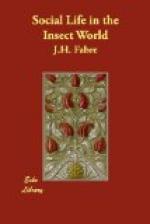This result astonishes me, for I have taken good care that the cage should never be long without food. The snail, the pine-cockchafer, the Praying Mantis, the lob-worm, the caterpillar, and other favourite insects, have all been given in alternation and in sufficient quantities. In devouring a brother whose damaged armour lent itself to any easy attack my beetles had not the excuse of hunger.
Is it their custom to kill the wounded and to eviscerate such of their fellows as suffer damage? Pity is unknown among insects. At the sight of the desperate struggles of a crippled fellow-creature none of the same family will cry a halt, none will attempt to come to its aid. Among the carnivorous insects the matter may develop to a tragic termination. With them, the passers-by will often run to the cripple. But do they do so in order to help it? By no means: merely to taste its flesh, and, if they find it agreeable, to perform the most radical cure of its ills by devouring it.
It is possible, therefore, that the Gardener with the injured wing-covers had tempted his fellows by the sight of his imperfectly covered back. They saw in their defenceless comrade a permissible subject for dissection. But do they respect one another when there is no previous wound? At first there was every appearance that their relations were perfectly pacific. During their sanguinary meals there is never a scuffle between the feasters; nothing but mere mouth-to-mouth thefts. There are no quarrels during the long siestas in the shelter of the board. Half buried in the cool earth, my twenty-five subjects slumber and digest their food in peace; they lie sociably near one another, each in his little trench. If I raise the plank they awake and are off, running hither and thither, constantly encountering one another without hostilities.
The profoundest peace is reigning, and to all appearances will last for ever, when in the early days of June I find a dead Gardener. Its limbs are intact; it is reduced to the condition of a mere golden husk; like the defenceless beetle I have already spoken of, it is as empty as an oyster-shell. Let us examine the remains. All is intact, save the huge breach in the abdomen. So the insect was sound and unhurt when the others attacked it.
A few days pass, and another Gardener is killed and dealt with as before, with no disorder in the component pieces of its armour. Let us place the dead insect on its belly; it is to all appearances untouched. Place it on its back; it is hollow, and has no trace of flesh left beneath its carapace. A little later, and I find another empty relic; then another, and yet another, until the population of my menagerie is rapidly shrinking. If this insensate massacre continues I shall soon find my cage depopulated.
Are my beetles hoary with age? Do they die a natural death, and do the survivors then clean out the bodies? Or is the population being reduced at the expense of sound and healthy insects? It is not easy to elucidate the matter, since the atrocities are commonly perpetrated in the night. But, finally, with vigilance, on two occasions, I surprise the beetles at their work in the light of day.




